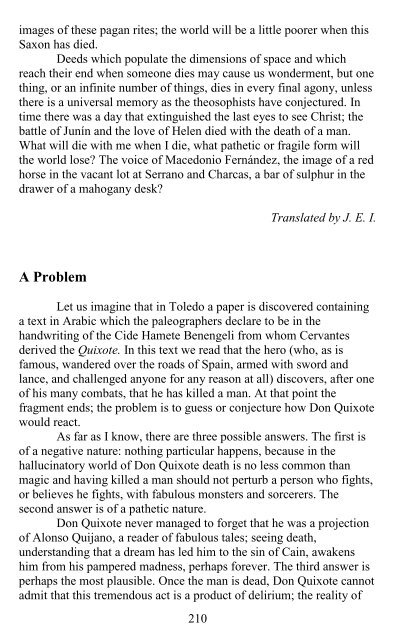Jorge Luis Borges - Labyrinths
Jorge Luis Borges - Labyrinths
Jorge Luis Borges - Labyrinths
Create successful ePaper yourself
Turn your PDF publications into a flip-book with our unique Google optimized e-Paper software.
images of these pagan rites; the world will be a little poorer when this<br />
Saxon has died.<br />
Deeds which populate the dimensions of space and which<br />
reach their end when someone dies may cause us wonderment, but one<br />
thing, or an infinite number of things, dies in every final agony, unless<br />
there is a universal memory as the theosophists have conjectured. In<br />
time there was a day that extinguished the last eyes to see Christ; the<br />
battle of Junín and the love of Helen died with the death of a man.<br />
What will die with me when I die, what pathetic or fragile form will<br />
the world lose The voice of Macedonio Fernández, the image of a red<br />
horse in the vacant lot at Serrano and Charcas, a bar of sulphur in the<br />
drawer of a mahogany desk<br />
Translated by J. E. I.<br />
A Problem<br />
Let us imagine that in Toledo a paper is discovered containing<br />
a text in Arabic which the paleographers declare to be in the<br />
handwriting of the Cide Hamete Benengeli from whom Cervantes<br />
derived the Quixote. In this text we read that the hero (who, as is<br />
famous, wandered over the roads of Spain, armed with sword and<br />
lance, and challenged anyone for any reason at all) discovers, after one<br />
of his many combats, that he has killed a man. At that point the<br />
fragment ends; the problem is to guess or conjecture how Don Quixote<br />
would react.<br />
As far as I know, there are three possible answers. The first is<br />
of a negative nature: nothing particular happens, because in the<br />
hallucinatory world of Don Quixote death is no less common than<br />
magic and having killed a man should not perturb a person who fights,<br />
or believes he fights, with fabulous monsters and sorcerers. The<br />
second answer is of a pathetic nature.<br />
Don Quixote never managed to forget that he was a projection<br />
of Alonso Quijano, a reader of fabulous tales; seeing death,<br />
understanding that a dream has led him to the sin of Cain, awakens<br />
him from his pampered madness, perhaps forever. The third answer is<br />
perhaps the most plausible. Once the man is dead, Don Quixote cannot<br />
admit that this tremendous act is a product of delirium; the reality of<br />
210


